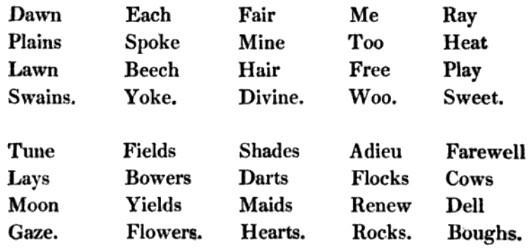By Louis Phillips, a poem that reads the same upside down:
MOM SWIMS WOW
By Louis Phillips, a poem that reads the same upside down:
MOM SWIMS WOW
In spite of her sniffle
Isabel’s chiffle.
Some girls with a sniffle
Would be weepy and tiffle;
They would look awful,
Like a rained-on waffle,
But Isabel’s chiffle
In spite of her sniffle.
Her nose is more red
With a cold in her head,
But then, to be sure,
Her eyes are bluer.
Some girls with a snuffle,
Their tempers are uffle.
But when Isabel’s snivelly
She’s snivelly civilly,
And when she’s snuffly
She’s perfectly luffly.
— Ogden Nash
A tail behind, a trunk in front,
Complete the usual elephant.
The tail in front, the trunk behind,
Is what you very seldom find;
If you for specimens should hunt
With trunks behind and tails in front,
That hunt would occupy you long;
The force of habit is so strong.
— A.E. Housman
This poem, by Lewis Carroll, can be read line by line in the conventional way, but the same text results when it’s scanned “downward” in columns, reading the first word of each of the six lines, then the second, and so on:
I often wondered when I cursed Often feared where I would be -- Wondered where she'd yield her love, When I yield, so will she. I would her will be pitied! Cursed be love! She pitied me ...
There was a fence with spaces you
Could look through if you wanted to.
An architect who saw this thing
Stood there one summer evening,
Took out the spaces with great care
And built a castle in the air.
The fence was utterly dumbfounded:
Each post stood there with nothing round it.
A sight most terrible to see.
(They charged it with indecency.)
The architect then ran away
To Afric- or Americ-ay.
— Christian Morgenstern
Sydney Smith wrote a recipe for salad dressing:
Two boiled potatoes, strained through a kitchen sieve,
Softness and smoothness to the salad give;
Of mordant mustard take a single spoon —
Distrust the condiment that bites too soon;
Yet deem it not, thou man of taste, a fault,
To add a double quantity of salt.
Four times the spoon with oil of Lucca crown,
And twice with vinegar procured from town;
True taste requires it, and your poet begs
The pounded yellow of two well-boiled eggs.
Let onions’ atoms lurk within the bowl,
And, scarce suspected, animate the whole;
And lastly in the flavoured compound toss
A magic spoonful of anchovy sauce.
Oh, great and glorious! oh, herbaceous meat!
‘Twould tempt the dying anchorite to eat.
Back to the world he’d turn his weary soul,
And plunge his fingers in the salad bowl.
In the late 19th century, such rhymes helped cooks to master recipes. When this one was reproduced in an 1871 cookbook, many committed it to memory.
A very efficient poem by Leigh Hunt:

Here, without any more ado, we have the whole history of a couple of successful rural lovers comparing notes. They issue forth in the morning; fall into the proper place and dialogue; record the charms and kindness of their respective mistresses; do justice at the same time to the fields and shades; and conclude by telling their flocks to wait as usual, while they renew their addresses under yonder boughs. How easily is all this gathered from the rhymes! and how worse than useless would it be in two persons, who have such interesting avocations, to waste their precious time and the reader’s in a heap of prefatory remarks, falsely called verses!
From The Liberal, 1822.
On April 1, 1990, an anonymous verse was posted to the comp.lang.perl newsgroup on Usenet. It was written in the programming language Perl 3:
BEFOREHAND: close door, each window & exit; wait until time.
open spellbook, study, read (scan, select, tell us);
write it, print the hex while each watches,
reverse its length, write again;
kill spiders, pop them, chop, split, kill them.
unlink arms, shift, wait & listen (listening, wait),
sort the flock (then, warn the "goats" & kill the "sheep");
kill them, dump qualms, shift moralities,
values aside, each one;
die sheep! die to reverse the system
you accept (reject, respect);
next step,
kill the next sacrifice, each sacrifice,
wait, redo ritual until "all the spirits are pleased";
do it ("as they say").
do it(*everyone***must***participate***in***forbidden**s*e*x*).
return last victim; package body;
exit crypt (time, times & "half a time") & close it,
select (quickly) & warn your next victim;
AFTERWORDS: tell nobody.
wait, wait until time;
wait until next year, next decade;
sleep, sleep, die yourself,
die at last
Because of the large number of English words that are used in the Perl language, the poem can actually be compiled as legal code and executed as a program. (It exits on line one, reaching the function exit, producing no output.)
The poem was attributed to “a person who wishes to remain anonymous,” but new “Perl poems” are regularly submitted to the programming community at PerlMonks.
Play with work blend, keep warmish feet,
Away drive trouble, slowly eat;
Air pure breathe, and early rise;
Beware excess, take exercise.
Exercise take, excess beware;
Rise early and breathe pure air;
Eat slowly; trouble drive away;
Feet warmish keep, blend work with play.
— “W.E.R.,” in Truth, Jan. 13, 1881
These verses can be interpreted to support either the Stuarts or the Hanovers, according as they’re read. If each is addressed separately, from top to bottom, they’ll seem to support the Hanoverian regime; read together, right across the page, they declare for the Stuarts:

From Reuben Percy, Relics of Literature, 1823.